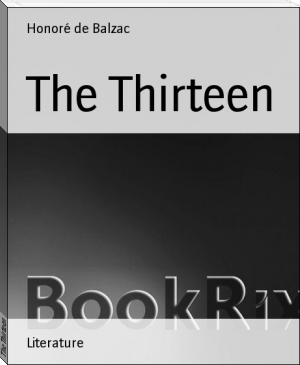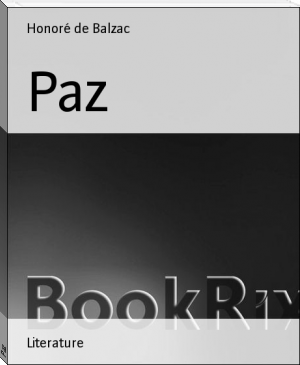The Thirteen - Honoré de Balzac (books to improve english TXT) 📗

- Author: Honoré de Balzac
Book online «The Thirteen - Honoré de Balzac (books to improve english TXT) 📗». Author Honoré de Balzac
Montriveau, down in the cabin, was left alone with Antoinette de Navarreins. For some hours it seemed as if her dead face was transfigured for him by that unearthly beauty which the calm of death gives to the body before it perishes.
"Look here," said Ronquerolles when Montriveau reappeared on deck, "_that_ was a woman once, now it is nothing. Let us tie a cannon ball to both feet and throw the body overboard; and if ever you think of her again, think of her as of some book that you read as a boy."
"Yes," assented Montriveau, "it is nothing now but a dream."
"That is sensible of you. Now, after this, have passions; but as for love, a man ought to know how to place it wisely; it is only a woman's last love that can satisfy a man's first love."
ADDENDUM
Note: The Duchesse de Langeais is the second part of a trilogy. Part one is entitled Ferragus and part three is The Girl with the Golden Eyes. In other addendum references all three stories are usually combined under the title The Thirteen.
The following personages appear in other stories of the Human Comedy.
Blamont-Chauvry, Princesse de
Madame Firmiani
The Lily of the Valley
Grandlieu, Duc Ferdinand de
The Gondreville Mystery
A Bachelor's Establishment
Modeste Mignon
Scenes from a Courtesan's Life
Granville, Comtesse Angelique de
A Second Home
A Daughter of Eve
Keller, Madame Francois
Domestic Peace
The Member for Arcis
Langeais, Duc de
An Episode under the Terror
Langeais, Duchesse Antoinette de
Father Goriot
Ferragus
Marsay, Henri de
Ferragus
The Girl with the Golden Eyes
The Unconscious Humorists
Another Study of Woman
The Lily of the Valley
Father Goriot
Jealousies of a Country Town
Ursule Mirouet
A Marriage Settlement
Lost Illusions
A Distinguished Provincial at Paris
Letters of Two Brides
The Ball at Sceaux
Modeste Mignon
The Secrets of a Princess
The Gondreville Mystery
A Daughter of Eve
Montriveau, General Marquis Armand de
Father Goriot
Lost Illusions
A Distinguished Provincial at Paris
Another Study of Woman
Pierrette
The Member for Arcis
Navarreins, Duc de
A Bachelor's Establishment
Colonel Chabert
The Muse of the Department
Jealousies of a Country Town
The Peasantry
Scenes from a Courtesan's Life
The Country Parson
The Magic Skin
The Gondreville Mystery
The Secrets of a Princess
Cousin Betty
Pamiers, Vidame de
Ferragus
Jealousies of a Country Town
Ronquerolles, Marquis de
The Imaginary Mistress
The Peasantry
Ursule Mirouet
A Woman of Thirty
Another Study of Woman
Ferragus
The Girl with the Golden Eyes
The Member for Arcis
Serizy, Comtesse de
A Start in Life
Ferragus
Ursule Mirouet
A Woman of Thirty
Scenes from a Courtesan's Life
Another Study of Woman
The Imaginary Mistress
Soulanges, Comtesse Hortense de
Domestic Peace
The Peasantry
Talleyrand-Perigord, Charles-Maurice de
The Chouans
The Gondreville Mystery
Letters of Two Brides
Gaudissart II
III. THE GIRL WITH THE GOLDEN EYES
DEDICATION
To Eugene Delacroix, Painter
One of those sights in which most horror is to be encountered is, surely, the general aspect of the Parisian populace--a people fearful to behold, gaunt, yellow, tawny. Is not Paris a vast field in perpetual turmoil from a storm of interests beneath which are whirled along a crop of human beings, who are, more often than not, reaped by death, only to be born again as pinched as ever, men whose twisted and contorted faces give out at every pore the instinct, the desire, the poisons with which their brains are pregnant; not faces so much as masks; masks of weakness, masks of strength, masks of misery, masks of joy, masks of hypocrisy; all alike worn and stamped with the indelible signs of a panting cupidity? What is it they want? Gold or pleasure? A few observations upon the soul of Paris may explain the causes of its cadaverous physiognomy, which has but two ages--youth and decay: youth, wan and colorless; decay, painted to seem young. In looking at this excavated people, foreigners, who are not prone to reflection, experience at first a movement of disgust towards the capital, that vast workshop of delights, from which, in a short time, they cannot even extricate themselves, and where they stay willingly to be corrupted. A few words will suffice to justify physiologically the almost infernal hue of Parisian faces, for it is not in mere sport that Paris has been called a hell. Take the phrase for truth. There all is smoke and fire, everything gleams, crackles, flames, evaporates, dies out, then lights up again, with shooting sparks, and is consumed. In no other country has life ever been more ardent or acute. The social nature, even in fusion, seems to say after each completed work: "Pass on to another!" just as Nature says herself. Like Nature herself, this social nature is busied with insects and flowers of a day--ephemeral trifles; and so, too, it throws up fire and flame from its eternal crater. Perhaps, before analyzing the causes which lend a special physiognomy to each tribe of this intelligent and mobile nation, the general cause should be pointed out which bleaches and discolors, tints with blue or brown individuals in more or less degree.
By dint of taking interest in everything, the Parisian ends by being interested in nothing. No emotion dominating his face, which friction has rubbed away, it turns gray like the faces of those houses upon which all kinds of dust and smoke have blown. In effect, the Parisian, with his indifference on the day for what the morrow will bring forth, lives like a child, whatever may be his age. He grumbles at everything, consoles himself for everything, jests at everything, forgets, desires, and tastes everything, seizes all with passion, quits all with indifference--his kings, his conquests, his glory, his idols of bronze or glass--as he throws away his stockings, his hats, and his fortune. In Paris no sentiment can withstand the drift of things, and their current compels a struggle in which the passions are relaxed: there love is a desire, and hatred a whim; there's no true kinsman but the thousand-franc note, no better friend than the pawnbroker. This universal toleration bears its fruits, and in the salon, as in the street, there is no one _de trop_, there is no one absolutely useful, or absolutely harmful--knaves or fools, men of wit or integrity. There everything is tolerated: the government and the guillotine, religion and the cholera. You are always acceptable to this world, you will never be missed by it. What, then, is the dominating impulse in this country without morals, without faith, without any sentiment, wherein, however, every sentiment, belief, and moral has its origin and end? It is gold and pleasure. Take those two words for a lantern, and explore that great stucco cage, that hive with its black gutters, and follow the windings of that thought which agitates, sustains, and occupies it! Consider! And, in the first place, examine the world which possesses nothing.
The artisan, the man of the proletariat, who uses his hands, his tongue, his back, his right arm, his five fingers, to live--well, this very man, who should be the first to economize his vital principle, outruns his strength, yokes his wife to some machine, wears out his child, and ties him to the wheel. The manufacturer--or I know not what secondary thread which sets in motion all these folk who with their foul hands mould and gild porcelain, sew coats and dresses, beat out iron, turn wood and steel, weave hemp, festoon crystal, imitate flowers, work woolen things, break in horses, dress harness, carve in copper, paint carriages, blow glass, corrode the diamond, polish metals, turn marble into leaves, labor on pebbles,





Comments (0)